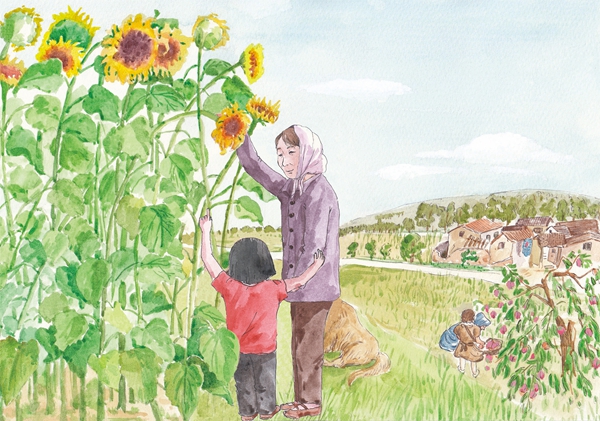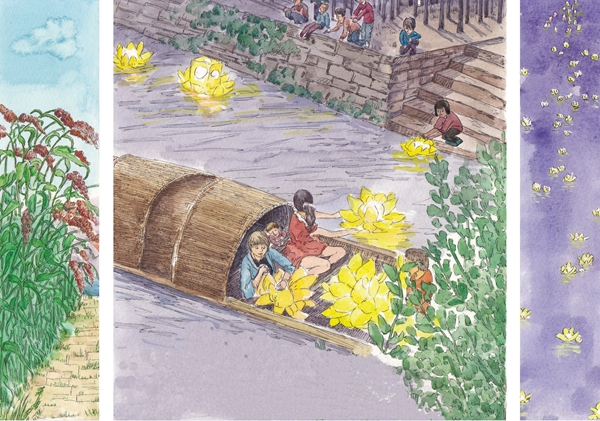Solar Spells
Editor’s Note: The Beginning of Autumn and End of Heat are the 13th and 14th of the 24 solar terms. This is a transitional period to the end of warmer weather.
Beginning of Autumn
The Beginning of Autumn (Liqiu) falls between August 7 and 9 according to the Gregorian calendar. Qiu (autumn) is a season for harvesting across the country. Liqiu is the first solar term of autumn, around which the summer heat still lingers, so it’s better seen as a transition from summer to autumn. There are still a few days ahead before the real cool autumn comes. According to meteorological standards, if the average temperature of a certain place, for five consecutive days, is between 10oC and 22oC, then it can be declared that autumn has arrived.

After the Beginning of Autumn, both the morning and night start to get cool, but it’s still hot during the day. The last period of the hottest days in a year comes after the Beginning of Autumn. In China, there is a farmer’s proverb which says: after the Beginning of Autumn, a cow can still be burnt to death. People call unseasonably warm weather occurring after the Beginning of Autumn Qiu Laohu (literally meaning “Autumn Tiger” in Chinese, it is the same as “an Indian Summer,” the only difference being that Chinese people don’t enjoy the extended hot spell). During an Indian Summer, most parts of China are still pretty hot and crops grow vigorously.
During this time of year, peaches are ripe, hanging heavily in trees, ready to be picked. Although your mouth might be watering, don’t forget to wash them over and over again as the hair on its skin will make your hand itchy!
Around the Beginning of Autumn, China’s most romantic festival of the year, the Qixi Festival, arrives.
Have you heard of the heart-breaking love story of Niulang (a cowherd) and Zhinü (a fairy maiden who is a weaver girl of the Heavenly Mother Queen), two lovers whose love was disapproved and were then separated by the Silver River (symbolizing the Milky Way) in Chinese mythology? Their tragic romance touched a flock of magpies, who decided to form a bridge every year on the seventh day of the seventh lunar month for them to reunite. This is how Qixi, the Double Seventh Festival, came into being. Overtime, this day has become China’s version of Valentine’s Day with millions of young people celebrating it every year.
The hot summer often causes people to lose their appetites; as a result, many people lose weight during the hot season. When autumn comes, as the coolness sets in; people normally take this opportunity to eat more in order to supplement what they lost during the summer. Many people in China prefer to eat hotpot with all kinds of meat, which is nicknamed, “gaining some autumn fat.”
End of Heat
The End of Heat (Chushu) is on August 23 according to the Gregorian calendar this year. Chu in Chinese means to end, and shu means summer or heat. This is a solar term reflecting the change in temperature. From this solar term on, it gets cooler and cooler with each passing day. In most parts of China, the rainy season draws to an end, plants such as rice and broomcorn are getting ready to be harvested, and everything under the sun is moving towards its hibernation phase. There are also a series of folk activities welcoming autumn – the season of harvest.

In northern China, due to the large temperature difference between day and night, people need to put on more clothes in the morning and at night when going out. In southern China, the scene is different: most parts are still undergoing an Indian Summer, and rain is scarce, so local meteorological agencies always choose to shoot artificial rainfall rockets into the sky to relieve high temperatures and droughts, to secure the water supply for the many farms.
At the end of August, dates on the trees turn from green to red. This fruit is a favorite among Chinese people, as they are flavorful as well as easily digestible. They are rich in vitamins, minerals, and health-benefiting phytonutrients. Since people believe that autumn is the time when the yin energy grows, dates (listed as a “warm” food as opposed to “cold” one by Traditional Chinese Medicine) are the perfect fruit to eat to stay healthy.
The Zhongyuan Festival is on the 15th day of the seventh lunar month in the Chinese calendar. Like the Qingming Festival (in spring), it’s also a day for people to pay tribute to their ancestors.
On this day, people take fresh dates, grapes, and some other fruits to their ancestors’ tombstones. At night, they place paper lights in the shape of lotus flowers on the river, and by seeing them float away they hope to show the dead how terribly they are missed.
To fishermen living in the coastal areas of China, the time after Chushu is a time to set sail and go fishing. Every year in Zhejiang province, there’s a grand ceremony to celebrate this exciting time. Also, from this time on, you can see a variety of fresh seafood at the market.
(Compiled by China Today based on The Twenty-Four Solar Terms Published by Dolphin Books)


